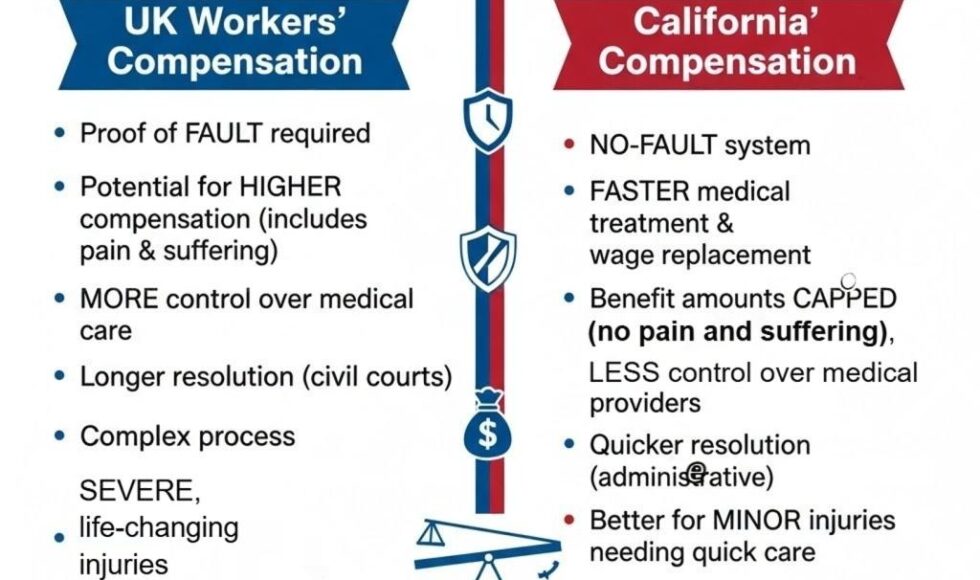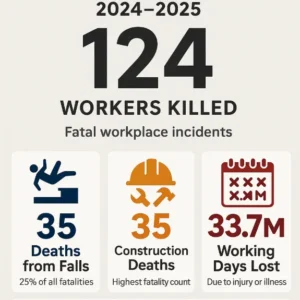Getting injured at work isn’t just painful—it throws your entire life into chaos. Medical bills pile up, you can’t work, and you’re suddenly stuck navigating legal systems you’ve never dealt with before. If you’re working in the UK or California, or your company operates in both countries, you need to understand that these systems work completely differently.
The UK operates on employers’ liability and personal injury claims through civil courts, while California uses a workers’ compensation system with administrative boards. If you’re injured in California, you’d typically search for the best workers’ comp attorney near me to handle your claim through the state’s Division of Workers’ Compensation. In the UK, you’d contact a personal injury solicitor who works on a no-win-no-fee basis to file a civil claim against your employer’s insurer.
How the UK System Works
UK employers must carry Employers’ Liability Insurance under the Employers’ Liability (Compulsory Insurance) Act 1969, with minimum coverage of £5 million per incident. When you get injured at work, you’re making a civil claim against your employer’s insurer, not going through a separate workers’ compensation system.
Key elements of UK workplace injury claims:
- You must prove your employer was negligent or breached their duty of care. This could be inadequate training, unsafe equipment, or failure to maintain a safe workplace.
- Claims go through the civil court system, not administrative boards. Your solicitor gathers evidence, negotiates with insurers, and may take your case to court if needed.
- The Health and Safety Executive (HSE) enforces workplace safety regulations separately from compensation claims. Employers must report serious injuries under RIDDOR 2013.
- You have three years from the date of injury or diagnosis to make a claim. This is your legal deadline, and missing it means you lose your right to compensation.
- Most solicitors work on “no win, no fee” arrangements, so you don’t pay legal fees unless you win your case.
The UK system focuses on proving fault. Your employer’s insurer will investigate whether the employer was negligent before paying compensation. In 2023/24, around 604,000 workers sustained non-fatal injuries at work, and 138 workers died in workplace accidents in the UK.
Compensation covers medical expenses (though the NHS handles most treatment), lost wages during recovery, pain and suffering, and future loss of earnings if you have permanent disability. The amount varies hugely depending on injury severity and how it affects your ability to work.
How California’s Workers’ Compensation System Works
Unlike finding the best workers’ comp attorney near me in California, injured UK workers search for personal injury solicitors who specialize in employers’ liability claims. The distinction matters because these are fundamentally different legal processes.
California employers must carry workers’ compensation insurance if they have even one employee. It’s a “no-fault” system—you don’t need to prove your employer caused the injury. You just need to show the injury happened at work during employment.
Key elements of California workers’ comp:
- Claims go through the Division of Workers’ Compensation (DWC), an administrative system rather than civil courts. You file paperwork with your employer within specific deadlines.
- Your employer has one working day to provide a claim form after you report an injury. They can’t delay or deny giving you this form.
- You’re entitled to medical treatment from doctors approved by the workers’ comp system. California uses evidence-based treatment guidelines from the American College of Occupational and Environmental Medicine.
- Temporary Disability (TD) benefits replace lost wages while you recover. For 2024, the maximum weekly benefit was $1,619.15, increasing to $1,680.29 for injuries occurring after January 1, 2025.
- Permanent Disability (PD) payments compensate for lasting impairment that affects your earning capacity. A California work injury lawyer helps calculate these benefits based on medical evaluations and state formulas.
- You generally can’t sue your employer for workplace injuries—workers’ comp is your exclusive remedy. However, you can sue third parties who contributed to your injury.
The California system processed hundreds of thousands of claims in 2023. Around 40% of workers’ compensation claims come from workers with less than one year of tenure at their employer.
Side-By-Side Comparison
| Aspect | UK System | California System |
|---|---|---|
| Legal Basis | Civil tort law + Employers’ Liability (Compulsory Insurance) Act 1969 | Workers’ Compensation (California Labor Code Division 4) |
| Proof Required | Must prove employer negligence or breach of duty | No-fault system; just prove injury occurred at work |
| Where Claims Are Handled | Civil courts | Division of Workers’ Compensation (administrative system) |
| Insurance Requirement | Employers’ Liability Insurance (minimum £5 million) | Workers’ Compensation Insurance (mandatory for employers with 1+ employees) |
| Medical Treatment | NHS provides most treatment; compensation covers private care costs | Workers’ comp pays for all medical treatment from approved providers |
| Lost Wages | Compensation for actual lost earnings | Temporary Disability payments (capped at $1,680.29/week in 2025) |
| Time Limit to File | 3 years from injury or diagnosis | Varies; must report injury promptly and file claim within specific deadlines |
| Legal Representation | Personal injury solicitors (no-win-no-fee) | Workers’ compensation attorneys (often contingency fees) |
| Right to Sue Employer | Yes, through civil courts | No, with limited exceptions |
| Pain and Suffering | Compensated as part of damages | Not compensated; only economic losses and disability ratings |
When You’d Need a Lawyer in Each Country
In the UK, you’d typically contact a solicitor if:
- Your employer’s insurer denies your claim or offers inadequate compensation
- Your injuries are severe or resulted in permanent disability
- There’s dispute about who was at fault
- Your employer retaliates against you for making a claim
- The injury happened because of a defective product from a manufacturer (potential third-party claim)
UK solicitors work on no-win-no-fee agreements, taking a percentage of your compensation only if you win. They handle all negotiations with insurers and represent you in court if necessary.
In California, workers search for the best workers’ comp attorney near me when:
- The insurance company denies or delays your claim
- You’re not receiving proper medical treatment
- Your temporary disability payments stop before you’re ready to return to work
- The permanent disability rating seems too low for your injuries
- Your employer retaliates against you for filing a claim
- You might have a claim against a third party (contractor, equipment manufacturer)
A California work injury lawyer navigates the DWC system, represents you at hearings, challenges medical evaluations, and ensures you receive maximum benefits. They understand how to calculate permanent disability ratings and negotiate settlements.
Third-Party Claims: Where Both Systems Overlap
Both countries allow injured workers to pursue additional compensation from third parties who contributed to the injury. This is where things get more interesting financially.
In the UK, if a contractor’s negligence or a defective product caused your injury, you can pursue separate claims against these parties while still claiming from your employer’s insurer. Your solicitor identifies these opportunities during the investigation.
California operates similarly. While workers’ comp is your exclusive remedy against your employer, you can file personal injury lawsuits against equipment manufacturers, subcontractors, property owners, or other third parties. A California work injury lawyer investigates these angles and pursues third-party claims when applicable. These lawsuits can recover damages that workers’ comp doesn’t cover, including pain and suffering and punitive damages.
Retaliation Protection
Both jurisdictions prohibit employer retaliation, but enforcement differs.
UK law makes it illegal under the Employment Rights Act 1996 for employers to dismiss or treat workers unfairly because they made a workplace injury claim. Workers can bring claims for unfair dismissal or discrimination to employment tribunals.
California Labor Code section 132a specifically prohibits discrimination against workers who file workers’ comp claims. The Americans with Disabilities Act and California Fair Employment and Housing Act provide additional protection for disabled workers. Retaliation cases can result in additional damages beyond the original injury claim.
Healthcare and Treatment Differences
This is where the systems diverge dramatically.
- UK workers get medical treatment primarily through the NHS, which is free at the point of use. Compensation claims include reimbursement for any private medical treatment you paid for, travel costs to medical appointments, and future care needs. You choose your own doctors through the NHS or private healthcare.
- California workers receive all medical care through the workers’ compensation system. Your employer or their insurer provides a list of approved doctors. You must treat with these providers unless you’ve pre-designated your own doctor before the injury. California uses Medical Provider Networks (MPNs) that restrict which doctors you can see. Independent Medical Review (IMR) resolves disputes about medical treatment authorization.
Cost Implications
The UK system allows employers and insurers more discretion in settlements because claims are negotiated individually based on specific circumstances. Compensation amounts aren’t capped by statute for the most part—they’re determined by the severity of injury and its impact on your life.
California’s system provides more predictable benefit amounts through statutory formulas and fee schedules. The state sets maximum temporary disability rates, permanent disability ratings, and medical fee schedules. This predictability helps employers budget for insurance costs but can limit what severely injured workers receive.
For 2024, California’s average advisory pure premium rate was $1.38 per $100 of payroll. Total losses and expenses in California’s system were $16.7 billion in 2024, or 108% of earned premium.
Statistics That Matter
UK (2024/25 data):
- 124 workers killed in fatal workplace incidents
- Construction had the highest fatality count (35 deaths), but agriculture, forestry and fishing have the highest fatality rate per 100,000 workers
- Falls from height caused 35 fatalities—over a quarter of all worker deaths
- 1.7 million workers suffered from work-related ill health in 2023/24
- 776,000 cases involved work-related stress, depression or anxiety
- 33.7 million working days lost due to work-related ill health or injury
California:
- Claim frequency remained modest in 2022-2023, consistent with pre-pandemic trends
- About 40% of workers’ comp claims involve workers with less than 1 year tenure
- Average indemnity costs continue increasing, driven by rising wage levels
- Cumulative trauma claims increased in 2022 and 2023
- Combined ratio for insurers reached 111% in 2023—the fourth consecutive year above 100%
Which System Is Better?
Neither system is perfect. They’re designed for different legal traditions and healthcare contexts.
The UK system gives injured workers more control over their medical care and potentially higher compensation for severe injuries. You can claim for pain and suffering, which California’s workers’ comp excludes. But you must prove fault, which adds time and complexity. Claims can take years to resolve through civil courts.
California’s no-fault system gets injured workers medical treatment and wage replacement faster. You don’t need to prove negligence—just that the injury happened at work. The administrative process is generally quicker than civil litigation. But benefit amounts are capped by statute, you can’t claim for pain and suffering, and you have less control over medical providers.
For workers dealing with minor injuries needing quick medical care and wage replacement, California’s system delivers faster. For workers with severe, life-changing injuries, the UK’s system might ultimately provide more comprehensive compensation, though it takes longer.
What This Means If You’re Working Across Borders
Companies with operations in both countries need separate insurance policies and must understand both systems. UK employers’ liability insurance doesn’t cover US injuries, and California workers’ comp doesn’t cover UK injuries.
Expat workers need to know which system covers them. Generally, you’re covered by the country where you’re working, not where your employer is based or where you’re from. The UK Employers’ Liability (Compulsory Insurance) Act 1969 explicitly states it doesn’t require insurance for employees working abroad, except in certain UK territorial waters.
If you’re a US company sending workers to the UK for extended periods, those workers fall under UK law and need UK-compliant insurance. Similarly, UK companies with California operations must provide workers’ comp coverage for their California-based employees.
Finding the Right Help
When injured in California, you’d search for the best workers’ comp attorney near me to find lawyers who specialize in navigating the Division of Workers’ Compensation. These attorneys understand the administrative hearing process, medical provider networks, and how to calculate permanent disability benefits. A skilled California work injury lawyer knows when to settle and when to take cases to trial before a Workers’ Compensation Administrative Law Judge.
In the UK, you’d look for personal injury solicitors with employers’ liability experience. Check they’re part of professional bodies like the Association of Personal Injury Lawyers (APIL) or Law Society Personal Injury Panel. Most work on no-win-no-fee agreements, making legal representation accessible regardless of your financial situation.
Final Thoughts
Workplace injuries disrupt your life whether you’re in Manchester or Los Angeles. Understanding which legal system applies to you and how it operates makes the difference between getting proper compensation and struggling through recovery alone.
The UK and California systems evolved from different legal traditions—tort law versus social insurance—and operate in different healthcare contexts. Neither is inherently superior; they’re just different approaches to the same problem: protecting injured workers and ensuring they receive medical care and financial support during recovery.
If you get injured, report it immediately, document everything, seek medical attention right away, and contact a lawyer who specializes in workplace injury claims in your jurisdiction. The systems are complex enough that professional guidance significantly improves your chances of receiving fair compensation.


